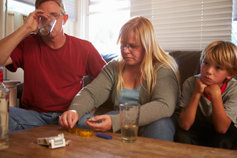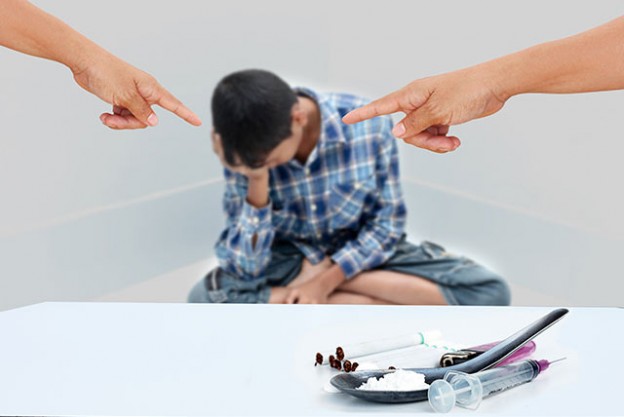The best types of questions will be open-ended and nonjudgmental. An open-ended question is one that cannot be answered with one word. Open-ended questions are helpful because they allow for increased communication and a better exchange of ideas. These questions have the goal of learning more information about your child and allowing them to express their concerns, struggles, and hopes.
The National Institute on Drug Abuse has additional tips to improve communication with your addicted child. When communicating, try to:
- Stay engaged and focused.
- Display a sense of acceptance and understanding.
- Be kind and respectful.
- Reduce distractions.
- Focus on the good.
- Diminish negative reactions.
Being overly emotional is not a part of assertive communication. If you find yourself too upset, sarcastic, or irrational to manage your emotions, consider leaving the situation with a plan to return to the subject at another time. It’s very important to return to the conversation within a reasonable period — ignoring the problem will not make it go away.
2. Encourage Positive Behaviors and Treatment
When there is too much focus on the mistakes and poor decision-making of the child, they will have diminished confidence, lower self-esteem, and a decreased sense of personal power. These effects can lead to continued substance use. Instead, emphasize the positives and encourage desirable behaviors.
Using encouragement and optimism builds a sense of teamwork and cooperation while reducing conflict and negativity. This style will enable them to:
- Try new healthy coping skills.
- Engage in new activities.
- Build more appropriate peer relationships.
- Face challenges.
Focus on 3 Positive Messages

Encouragement is not based on comparing your child to others, solving their problems for them, or focusing on past failures. Instead, according to NIDA, they focus on three positive messages:
- You can do it. Example: “You can be successful. I believe it you.”
- You have good ideas. Example: “You are smart and capable. How can I assist you?”
- You are important. Example: “I value you and need you in my life.”
By keeping these messages in mind when interacting with your child, the communication will be empowering rather than critical or defeating. Communicating in a way that conveys you want your child to develop his full potential may also help you get him into a treatment program, a necessary step for many people to recover from drug addiction. You can be a partner to your child by helping research and tour treatment facilities. You can also provide continued support by attending appointments and family therapy. A healthy family dynamic is an essential element of success in recovery.
3. Create and Reinforce Consistent Guidelines
Establishing guidelines will set clear expectations for your child regarding acceptable and unacceptable behaviors. Clear, consistent rules are related to improved outcomes with addiction. Not only will guidelines help your child, they will help determine your reactions to situations as they present.
Guidelines work best when they are developed in collaboration with your child. This way, all parties have a say regarding the consequences of their behaviors before the behavior is completed.
The best guidelines will read like a list of cause and effect statements — if (action) occurs (response) will be the consequence. Since it is concretely established, there will be no surprises later. Of course, it will be impossible to cover every contingency, but by establishing guidelines for the most common events, you can reduce the odds of emotionally fueled reactions that have less-than-productive outcomes.
No matter how strong your guidelines, poor consistency will render them ineffective. If your child has been driving under the influence and you take their keys in some situations but not others, you are reducing the efficacy of your guidelines. This inconsistency will diminish the relationship with your child as their respect for you decreases.
 Your child’s life is precious. Call 92 51 8467081 to learn about treatment options.
Your child’s life is precious. Call 92 51 8467081 to learn about treatment options.
All calls are confidential.
4. Set Clear Boundaries
Whereas guidelines are a set of rules based on behaviors, your boundaries are the things that you will and will not do for your child. They represent reasonable ways for people to treat you and for you to treat them. Those with drug addictions are notoriously good at testing the boundaries of those they love directly, or indirectly through manipulation. Set your boundaries during periods of calm when you can think rationally about what you will accept and what you won’t. This will help you avoid inconsistency during times when your boundaries are tested.
Set your boundaries during periods of calm when you can think rationally about what you will accept and what you won’t. This will help you avoid inconsistency during times when your boundaries are tested.
To build strong, clear boundaries with your child, consider the following questions:
- Are you willing to lie for your child?
- Are you willing to sacrifice your needs for the wants of your child?
- What level of substance use are you willing to accept, if any?
- How do you expect to be treated by your child?
Are You Enabling Your Child?
Boundaries help to clarify the distinction between helping your child and enablingyour child. Enabling is a sign of poor boundaries where you begin taking on too much responsibility for the actions of your child. Enablers will:
- Make excuses.
- Blame themselves.
- Focus on reducing short-term pain.
- Unintentionally reinforce use.
Strong boundaries may increase conflict in the short-term, but they will show your child that you cannot be manipulated by their actions. With clear and appropriate boundaries set, the responsibility for your child’s action lies with them, which increases the likelihood of eventual willingness to seek treatment.
5. Practice Self-Care
Having strong guidelines and boundaries will aid in your ability to lower stress, but to achieve the desired results you must actively practice self-care.
Self-care is the act of making your needs a priority and is a valuable tool for parents of addicted children. As you attempt to care for your child’s needs during long periods of turmoil, your stress grows towards burnout. Increased stress can present as a number of physical and mental health conditions like:
- Depression.
- Anxiety.
- Reduced immune system (making you more prone to illness).
- Obesity.
- Memory and attention problems.
- Heart disease.
- Cancer.
- Diabetes.
- Arthritis.
Tips to Better Care for Yourself
The U.S. Department of Health and Human Services has a list of ways to improve self-care that includes:
- Asking for and accepting help.
- Spending time doing activities you enjoy with people you like.
- Caring for your mental and physical health.
- Joining a support group.
- Reducing stress in other areas of your life.
- Practicing relaxation skills.
Caring for yourself will actually aid in your ability to care for your child, because if you are experiencing unwanted effects from stress, you will be less competent in decision-making, consistency, and encouragement. Practicing appropriate self-care also allows you to model desirable behaviors for your child. You can lead by example.
In some situations, you cannot maintain your own health if your child’s actions continue without change. More restrictive boundaries and guidelines may be needed to improve your well-being, with terminating the relationship being an option to be considered in extreme circumstances.
When attempting to get your child into recovery from drug abuse, you need to be educated on addiction, the specific substance of abuse, and treatment options. If you lack the knowledge and expertise regarding addiction and your child’s drugs of abuse, you will not have the information necessary to assist them.
For example, someone abusing a stimulant substance will react in very different ways when they are under the influence compared to when they have ended a binge. Someone using a depressant substance will present very differently from someone under the influence of other drugs. By researching the signs and symptoms of the drug, you will be able to:
- Note periods of use.
- Note periods of abstinence.
- Deliver appropriate consequences.
- Reduce the risk of manipulation.
Another topic worthy of investigation is addiction itself. The way you view addiction will influence the way you view your child. The National Institute on Drug Abuse considers addiction to be a long-term condition marked by periods of relapse and recovery. In this way, it is not very different from other conditions like hypertension or diabetes. It also causes marked and predictable changes in the brain, meaning that drug use can be extremely difficult to stop for physiological reasons – it is not simply a moral failing. Realizing this enables you to have compassion for your child and helps reduce the stigma around your child’s addiction. De-stigmatizing your child’s addiction can raise her sense of self-worth and chances of maintaining long-term recovery.








